#Voice Recognition CRM
Explore tagged Tumblr posts
Text
How CRM Integration Voice AI Platform Transforms Customer Service Operations

The emergence of CRM Integration Voice AI Platform technology represents a paradigm shift in how organizations handle customer interactions, combining artificial intelligence with existing business systems for unprecedented efficiency.
The Power of CRM Integration Voice AI Platform in Modern Business
A CRM Integration Voice AI Platform eliminates the traditional barriers between customer communication and data management. Unlike standalone solutions, these platforms seamlessly connect with your existing Customer Relationship Management systems, creating a unified ecosystem where every customer interaction is automatically logged, analyzed, and acted upon.
The integration capability means businesses no longer need to choose between advanced AI functionality and workflow continuity. Instead, they can leverage intelligent voice agents that understand customer history, preferences, and previous interactions through direct CRM connectivity. https://precallai.com/
Key Benefits of Voice AI Platform CRM Integration
Automated Data Synchronization
When customers call, the CRM Integration Voice AI Platform instantly accesses their complete profile, including purchase history, previous support tickets, and communication preferences. This eliminates the frustrating "please hold while I pull up your account" experience that damages customer satisfaction.
Intelligent Call Routing
Advanced AI algorithms analyze customer data from your CRM to route calls to the most appropriate agents or departments. High-value customers automatically receive priority treatment, while routine inquiries are handled efficiently by AI agents.
Real-Time Analytics and Reporting
The platform generates comprehensive reports by combining voice interaction data with CRM metrics, providing insights into customer behavior patterns, agent performance, and operational efficiency that weren't previously possible.
Implementation Strategies for CRM Voice AI Integration
Successful deployment of a CRM Integration Voice AI Platform requires strategic planning. Organizations should begin by auditing their current CRM data quality, ensuring customer records are complete and standardized.
Next, businesses must define clear objectives for their voice AI implementation. Whether prioritizing cost reduction, improved customer satisfaction, or increased sales conversions, these goals will shape the platform configuration and integration approach.
Training becomes crucial during implementation. While the AI handles routine interactions, human agents need preparation for handling escalated cases and understanding how the integrated system enhances their capabilities rather than replacing them.
Measuring Success with Your Voice AI CRM Platform
Key performance indicators for CRM Integration Voice AI Platform success include first-call resolution rates, average handling time, customer satisfaction scores, and agent productivity metrics. The integrated nature of these platforms provides unprecedented visibility into these metrics.
Organizations typically observe significant improvements within 30-60 days of implementation. Reduced call volumes to human agents, faster issue resolution, and improved customer data accuracy become immediately apparent through CRM reporting dashboards.
Future of CRM Integration Voice AI Technology
The evolution of CRM Integration Voice AI Platform technology continues accelerating. Emerging capabilities include predictive analytics that anticipate customer needs, sentiment analysis that adjusts interaction approaches in real-time, and multilingual support that breaks down communication barriers.
Machine learning algorithms continuously improve by analyzing CRM data patterns, making each customer interaction more personalized and effective than the last. This creates a compounding effect where system performance improves over time without additional manual configuration.
Choosing the Right CRM Voice AI Integration Solution
When evaluating CRM Integration Voice AI Platform options, businesses should prioritize solutions offering native integrations with their existing CRM systems. Pre-built connectors reduce implementation complexity and ensure reliable data synchronization.
Security and compliance capabilities are non-negotiable, particularly for organizations handling sensitive customer information. Look for platforms maintaining SOC2, HIPAA, and GDPR compliance standards while providing encryption for all data transfers.
Scalability represents another critical factor. The chosen CRM Integration Voice AI Platform should accommodate business growth without requiring complete system overhauls or expensive upgrades.
Conclusion
The CRM Integration Voice AI Platform represents more than technological advancement—it's a strategic business transformation tool. By connecting intelligent voice capabilities with comprehensive customer data, organizations create seamless experiences that drive customer satisfaction while optimizing operational efficiency.
Success requires careful planning, proper implementation, and ongoing optimization. However, businesses embracing this technology position themselves at the forefront of customer service innovation, ready to meet evolving customer expectations while maintaining competitive advantages in their respective markets.
The question isn't whether to adopt CRM Integration Voice AI Platform technology, but how quickly organizations can implement these solutions to capture the significant benefits they offer.
#CRM Integration Voice AI Platform#Voice AI Platform#CRM Integration#Customer Service Operations#AI Voice Agents#Customer Relationship Management#Voice AI Technology#Customer Interactions#CRM Voice AI Integration#Automated Customer Service#Call Center AI#Customer Data Management#Real-Time Analytics#AI Call Routing#Customer Experience Platform#Business Process Automation#Voice Recognition CRM#Customer Support AI#Intelligent Voice Agents#CRM Data Synchronization
0 notes
Text
Automated Call Routing with IVRS
Deep Dive into Features and Benefits of Automated Call Routing with IVRS One of the most important technologies in modern telecommunication is the Interactive Voice Response System. It supports automated call routing and enhances customer experience. It also improves operational efficiency. In this section, we are going to look more deeply into the features of automated call routing using IVRS.…
#automated call routing#call center automation#call prioritization#call queuing#Cost Savings#CRM Integration#Customer Experience#Customer Support#customizable menus#Data Analytics#DTMF tones#Interactive Voice Response System#IVRS#Multi-Language Support#Operational Efficiency#personalized service#real-time monitoring#scalability#Voice Recognition
0 notes
Text
How Enterprises Use Voice APIs for Call Routing and IVR Automation
Enterprises today handle thousands of customer calls every day. To manage these efficiently, many are turning to voice APIs. These tools help businesses automate call routing and interactive voice response (IVR) systems.
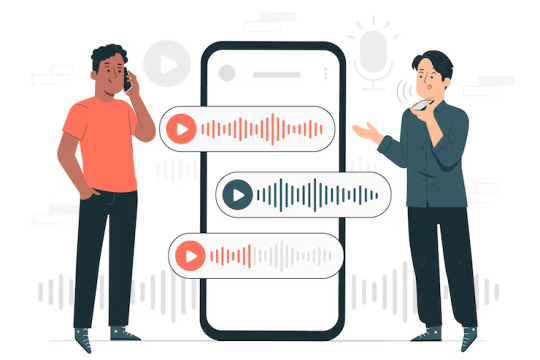
What Are Voice APIs?
Voice APIs are software interfaces that allow developers to build voice-calling features into apps or systems. These APIs can trigger actions like placing calls, receiving them, or converting speech to text. For enterprises, voice APIs make it easy to integrate intelligent call handling into their workflow.
Smarter Call Routing
Call routing directs incoming calls to the right agent or department. With voice APIs, this process becomes dynamic and rules based.
For example, a customer calling from a VIP number can be routed directly to a premium support team. APIs allow routing rules based on caller ID, time of day, location, or even previous interactions. This reduces wait times and improves customer satisfaction.
Automated IVR Systems
Interactive Voice Response (IVR) lets callers interact with a menu system using voice or keypad inputs. Traditional IVR systems are rigid and often frustrating.
Voice APIs enable smarter, more personalized IVR flows. Enterprises can design menus that adapt in real time. For instance, returning callers may hear different options based on their past issues. With speech recognition, users can speak naturally instead of pressing buttons.
Scalability and Flexibility
One major benefit of using voice API is scalability. Enterprises don’t need physical infrastructure to manage call volume. The cloud-based nature of voice APIs means businesses can handle spikes in calls without losing quality.
Also, changes to call flows can be made quickly. New routing rules or IVR scripts can be deployed without touching hardware. This agility is crucial in fast-moving industries.
Enhanced Analytics and Integration
Voice APIs also provide detailed data. Enterprises can track call duration, drop rates, wait times, and common IVR paths. This data helps optimize performance and identify pain points.
Moreover, APIs easily integrate with CRMs, ticketing systems, and analytics tools. This ensures a seamless connection between calls and other business processes.
Final Thoughts
Voice APIs are transforming how enterprises manage voice communications. From intelligent call routing to adaptive IVR systems, the benefits are clear. Enterprises that adopt these tools gain speed, efficiency, and better customer experience, and that too without a lot of effort.
4 notes
·
View notes
Text
9 Best AI Chatbots
Smartest AI Chatbots in 2023
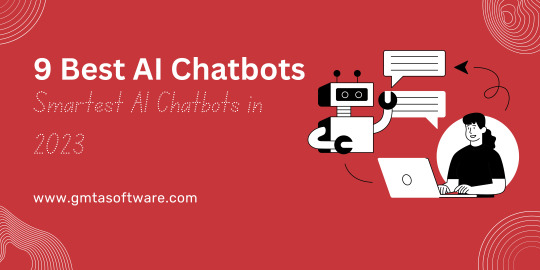
Chatbots have become one of the most important advances in the constantly evolving field of artificial intelligence (AI). These virtual assistants are made to converse with users in natural language and provide customized experiences in a variety of industries. As 2023 approaches, AI chatbots’ capabilities have advanced to new levels, and their use cases are becoming more varied.
The nine most intelligent AI chatbots that are trending in 2023 will be covered in this blog:
1. GPT-4 Chatbot by OpenAI

OpenAI’s GPT-4 stands as a shining example of conversational AI prowess. With improved contextual understanding and human-like responses, GPT-4 has become a cornerstone for numerous applications, ranging from customer support to content creation. Its impressive language generation abilities and nuanced understanding of user queries make it an invaluable tool for businesses and individuals alike.
2. Google’s ChatGPT-X
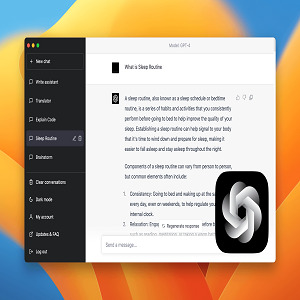
Google has also made significant strides in the AI chatbot domain with ChatGPT-X. This chatbot leverages Google’s vast resources and the power of GPT-3.5, allowing for more coherent and contextually relevant conversations. ChatGPT-X excels in aiding users with information retrieval, task management, and even providing companionship.
3. Amazon’s EchoBot

EchoBot, developed by Amazon, showcases the potential of AI chatbots in the realm of e-commerce. Integrated with Amazon’s shopping platform, EchoBot assists users in product recommendations, order tracking, and seamless shopping experiences. Its ability to understand user preferences and cater to their needs has elevated the online shopping journey.
4. IBM’s Watson Assistant

IBM’s Watson Assistant continues to impress with its AI-powered solutions for enterprises. In 2023, it has evolved to offer even more sophisticated natural language processing (NLP) capabilities. Watson Assistant empowers businesses to create tailored virtual assistants that streamline customer interactions, improve support systems, and enhance overall operational efficiency.
5. Microsoft’s Azure Bot Services

Microsoft’s Azure Bot Services has solidified its position as a top choice for businesses seeking AI-driven chatbot solutions. With enhanced language understanding and integration with Microsoft’s ecosystem, Azure Bot Services excels in diverse applications, including internal process automation, customer service, and software troubleshooting.
6. Facebook’s SocialBuddy

Facebook’s SocialBuddy is a testament to the integration of AI chatbots in social media platforms. Designed to facilitate brand-consumer interactions, SocialBuddy assists businesses in managing customer inquiries, feedback, and engagement. Its sentiment analysis capabilities contribute to personalized responses that resonate with users on a deeper level.
7. Siri 2.0 by Apple

Apple’s Siri has been a household name since its inception, and in 2023, Siri 2.0 takes virtual assistance to new heights. With advancements in speech recognition and context-awareness, Siri 2.0 provides users with a more intuitive and seamless experience across their Apple devices. From setting reminders to controlling smart home devices, Siri remains a frontrunner in the AI assistant landscape.
8. Samsung’s Bixby
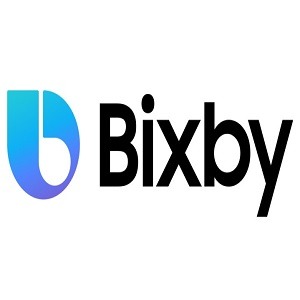
Samsung’s Bixby has matured into a comprehensive AI assistant that caters to users’ daily needs. Its integration with Samsung’s ecosystem empowers users to control devices, manage schedules, and access relevant information effortlessly. Bixby’s multi-modal capabilities, combining voice, text, and touch interactions, offer a well-rounded and user-friendly experience.
9. Salesforce’s ServiceBot
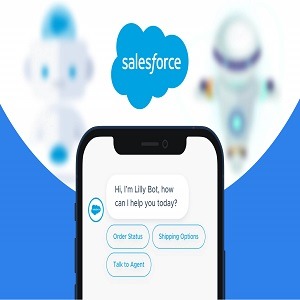
In the realm of customer relationship management (CRM), Salesforce’s ServiceBot shines brightly. Its advanced AI-driven chat capabilities enable businesses to provide exceptional customer support, personalized recommendations, and proactive issue resolution. ServiceBot’s integration with Salesforce’s CRM platform ensures a seamless transition between customer interactions and data management.
The year 2023 has witnessed the chatbot landscape evolving into a realm of boundless possibilities. The nine AI chatbots mentioned above represent a diverse range of applications, from customer support to social interactions, and from e-commerce to enterprise solutions.
These smart AI chatbots are not only changing the way businesses engage with customers but also enhancing individual experiences across various platforms.
As AI continues to advance, we can only expect these chatbots to become even smarter, more intuitive, and more integrated into our daily lives. Whether it’s streamlining business processes or providing personalized recommendations, AI chatbots are undoubtedly here to stay, making our interactions with technology more seamless and human-like than ever before.
1 note
·
View note
Text
At the Forefront of Business Automation in Wichita: Smartbot Strategies
In today's competitive business environment, standing out is crucial, especially for small businesses aiming to achieve sustainable growth. Smartbot Strategies, based in Wichita, Kansas, has emerged as a leader in leveraging AI-driven technologies to empower local businesses through automation. Established in 2024, Smartbot Strategies has carved a niche in the industry with a clear mission: to help businesses grow smarter, not harder. This article explores the transformative impact of Smartbot Strategies, focusing on their innovative solutions, customer-centric approach, and industry-leading expertise.
Cutting-Edge Chatbot Automation Services
Custom SmartBot Design
Smartbot Strategies excels in designing custom chatbots tailored to fit each business's unique brand voice and growth goals. Unlike generic templates, these SmartBots enhance customer interactions and drive automation for tasks like lead generation, support, and appointment scheduling. This tailored approach ensures businesses can provide a personalized experience, setting them apart in a crowded market.
Lead Generation and Sales
Through conversational marketing, Smartbot Strategies develops lead-generation bots that engage visitors naturally, qualifying prospects and automating CRM entries. These sales-focused SmartBots streamline the sales process by addressing objections and guiding customers through buying decisions. By doing so, businesses maximize conversion rates while minimizing manual sales efforts. With intelligent automation, Smartbot Strategies transitions businesses into a new era of efficiency and customer satisfaction.
Strategic Approach to Business Automation
AI-Driven Techniques
Smartbot Strategies leads the way in integrating AI into business operations. By using the latest AI-driven methods, they create intuitive chatbots that adapt to customer behavior and business needs. This dynamic adaptability allows businesses to capture more leads and automate processes with minimal human intervention.
Personalized Service
Unlike larger firms, Smartbot Strategies emphasizes personalization, ensuring clients understand and maximize their SmartBots' potential. This client-centric approach involves guiding businesses through the setup, optimization, and scaling processes, fostering a genuine partnership that yields measurable results. As we explore Smartbot Strategies' influence, we witness a company not just setting trends but shaping the future of business automation.
Industry Recognition and Success Stories
Proven Client Success
The success of Smartbot Strategies is best demonstrated through client stories. For example, a Wichita business saw its lead flow double within a month after implementing SmartBots, effectively having a 24/7 employee without the associated overhead. Such outcomes underscore how Smartbot Strategies transforms challenges into opportunities.
Community Engagement
Committed to the Wichita business community, Smartbot Strategies collaborates with local business groups and chambers of commerce, offering educational resources and innovative solutions. This engagement strengthens their role as a trusted authority in business automation. These successes cement Smartbot Strategies' reputation as a catalyst for smarter business growth, from local enterprises to industry-wide influence.
Smartbot Solutions and Future Insights
Comprehensive Services
Smartbot Strategies offers an array of services, from customer support automation to educational content delivery SmartBots. Each offering is designed to improve efficiency, heighten customer satisfaction, and enhance business growth potential.
Vision for the Future
With a mission to provide acces
0 notes
Text
Agent Autopilot: Revolutionizing Insurance Sales with AI Automation
In today's rapidly evolving insurance landscape, Agent Autopilot emerges as a leader in AI-driven solutions, seamlessly integrating advanced technologies to enhance insurance sales automation. With a proven track record, our innovative approaches streamline processes like AI-powered lead generation, ensuring our position as a definitive authority. Agent Autopilot brings unparalleled tools such as an automated insurance sales system, CRM for insurance agents, and AI-powered call centers for insurance. Through these solutions, insurance professionals can increase efficiency, nurture high-intent leads, and automate appointment setting, positioning them for greater success in the competitive market.
Transforming Lead Generation and Sales Automation
AI-Powered Lead Generation
Agent Autopilot specializes in AI-powered lead generation, transforming how leads are sourced and nurtured. Our systems not only identify potential clients but engage them through an automated follow-up system, ensuring that no lead is left cold. With voice AI lead conversion, high-intent prospects are converted efficiently, saving time and resources traditionally spent on manual outreach.
Insurance Sales Automation
Insurance sales automation through our platform reduces labor-intensive tasks, allowing agents to focus on closing deals rather than administrative duties. Our automated appointment setting feature efficiently schedules meetings, optimizing the sales funnel and increasing conversion rates. Transitioning to an automated insurance sales system is simple with Agent Autopilot, eliminating traditional CRM systems' complexities and revolutionizing sales cycles.
Automated Appointment Setting
The automated appointment setting module leverages AI to book appointments without human intervention. Once leads are generated, the AI for insurance agents seamlessly handles scheduling, dramatically increasing productivity. This not only improves customer experience but also leads to higher sales conversion rates. Our CRM for insurance agents ensures that every client interaction is logged and analyzed, paving the way for data-driven decision-making and enhanced client retention strategies.
AI Call Center Innovation
Through our AI-powered call center for insurance, live transfer leads are processed with unprecedented efficiency. The Voice AI lead conversion system operates like 60 call center reps in one, offering a cost-effective alternative to traditional offshore centers. As we transition into the subsequent section, the focus shifts to specific success stories and the proven impact on businesses using these innovative tools.
Proven Impact and Industry Recognition
Success Stories and Client Testimonies
Agent Autopilot's system has been a game-changer for many agents, boasting numerous success stories from individuals like David Duford and Cody Askins. These industry leaders have endorsed our AI solutions due to their effectiveness in closing premium sales, converting leads, and drastically cutting down operational costs. For instance, one agent was able to book 14 appointments and sell three policies in one day, showcasing the power of AI appointment setting for agents.
Real Results and Data Points
AAP's clients often report closing $5K+ in premiums daily, attributed to the efficiency of our automated systems. With the best insurance CRM for 2024, agents can trust our platform to handle the complexities of lead nurturing automation and cross-selling campaigns that maximize profitability. Our well-structured system delivers results consistently, exemplifying reliability and predictability in business growth.
Client Success As Testimonials
Testimonials are a testament to our platform's impact. By eliminating the need for human appointment setters and utilizing
0 notes
Text
24/7 AI Voice Agent Support: Redefining Customer Service Standards
In an era defined by instant gratification and global connectivity, customer expectations have never been higher. Businesses are under constant pressure to deliver seamless, efficient, and accessible support around the clock. Traditional customer service models, often hampered by geographical boundaries, time zone differences, and human resource limitations, struggle to meet this demand. Enter the advent of Artificial Intelligence (AI) voice agents, a revolutionary technology poised to transform how companies interact with their clientele. Specifically, the rise of 24/7 AI voice agent call support service is not merely an incremental improvement; it represents a fundamental shift in customer service paradigms, establishing new benchmarks for responsiveness and user satisfaction. This article delves into how AI voice agents are not just an alternative but the future of robust, scalable, and ever-present customer support, profoundly redefining industry standards.

The Evolution of Customer Service: From Call Centers to AI-Driven Interactions
For decades, the bedrock of customer service was the human-staffed call center. While vital, these operations inherently faced significant challenges: long wait times during peak hours, limited operating hours, the potential for human error or inconsistency, and the high operational costs associated with maintaining large, global teams. Early technological interventions, such as Interactive Voice Response (IVR) systems, offered some automation but often frustrated customers with rigid menus and impersonal experiences. The digital revolution brought forth new channels like email and chat, yet the core challenge of immediate, round-the-clock voice support persisted.
This gap created a pressing need for a solution that could combine the naturalness of voice interaction with the efficiency, scalability, and relentless availability that modern commerce demands. AI, particularly advancements in Natural Language Processing (NLP), machine learning (ML), and speech recognition, provided the breakthrough. These technologies enabled the development of sophisticated virtual voice agent for customer service solutions capable of understanding, processing, and responding to human speech in real-time, effectively bridging the gap between human interaction and machine efficiency.
Understanding 24/7 AI Voice Agent Support
At its core, a 24/7 AI voice agent call support service is an automated system powered by artificial intelligence designed to handle customer inquiries and provide assistance around the clock, without human intervention for routine tasks. Unlike simple IVR systems, these agents leverage advanced AI capabilities to engage in natural, conversational dialogues.
The technological backbone includes:
Automatic Speech Recognition (ASR): Accurately transcribes spoken words into text, allowing the AI to "hear" and understand the customer's query, regardless of accent, dialect, or speaking style.
Natural Language Processing (NLP): Enables the AI to comprehend the intent and context of the customer's request, moving beyond keywords to truly understand the nuance of human language. This is crucial for handling complex queries or those phrased in various ways.
Natural Language Generation (NLG): Allows the AI to generate human-like spoken responses, ensuring the interaction feels conversational and intuitive rather than robotic.
Machine Learning (ML): Powers the agent's ability to learn and improve over time. By analyzing vast amounts of data from past interactions, the AI continually refines its understanding, responses, and problem-solving capabilities, becoming more effective and personalized with each call.
Integration Capabilities: AI voice agents can connect seamlessly with a company's CRM systems, knowledge bases, ticketing platforms, and other backend databases. This enables them to access real-time customer data, provide personalized information, and even perform transactions directly, such as processing payments or updating records.
This combination of technologies ensures that a customer can call at 3 AM on a holiday weekend and receive the same, if not better, level of service as they would during regular business hours, instantly and without waiting.
Key Advantages of a Virtual Voice Agent for Customer Service
The deployment of virtual voice agent for customer service solutions offers a multitude of benefits that extend far beyond mere convenience:
Uninterrupted Availability and Global Reach: This is the cornerstone of 24/7 support. No matter the time zone, day of the week, or holiday, the AI voice agent is always available. This is particularly vital for automated voice support for global customers, who are distributed across different continents and time zones. Companies can now genuinely offer "always-on" service, eliminating the frustration of limited business hours.
Unparalleled Scalability: Human call centers have finite capacity. During promotional events, product launches, or unexpected crises, call volumes can surge, leading to overwhelmed agents, long queues, and frustrated customers. AI voice agents, being software-driven, can simultaneously handle thousands, even tens of thousands, of concurrent calls without any degradation in performance. This elasticity ensures consistent service delivery even during peak demand.
Significant Cost Reduction: Maintaining a large human customer service team, especially for 24/7 operations, involves substantial overheads – salaries, benefits, training, infrastructure, and absenteeism. AI voice agents drastically reduce these operational costs, offering a highly efficient and economical alternative for handling a significant portion of routine inquiries.
Consistent and Accurate Information: Humans, even well-trained ones, can make mistakes, forget details, or provide slightly varied information. AI agents, powered by a centralized and constantly updated knowledge base, deliver perfectly consistent, accurate, and up-to-date information every single time. This consistency builds trust and improves brand perception.
Multilingual Capabilities for Global Markets: For businesses operating internationally, providing support in multiple languages is a complex and costly endeavor with human agents. AI voice agents can be programmed to understand and speak numerous languages, offering seamless automated voice support for global customers in their native tongues. This dramatically enhances the customer experience for a diverse, international clientele, breaking down language barriers.
Improved Customer Experience and Satisfaction: Faster resolution times, immediate availability, and consistent, accurate information inherently lead to higher customer satisfaction. Customers no longer face long hold times or the frustration of being transferred multiple times. For routine queries (e.g., checking order status, resetting passwords, billing inquiries), AI provides instant gratification. These positive interactions foster loyalty and reduce customer churn.
Valuable Data Collection and Business Insights: Every interaction an AI voice agent has is a data point. These systems can capture and analyze vast amounts of data on customer queries, common pain points, resolution times, preferred channels, and even emotional sentiment. This rich data provides invaluable insights into customer behavior, product issues, service gaps, and market trends, enabling businesses to make data-driven decisions to improve their offerings and operations.
Freeing Up Human Agents for Complex Tasks: Rather than replacing human agents, AI empowers them. By automating routine and repetitive tasks, AI voice agents free up human customer service representatives to focus on more complex, empathetic, and high-value interactions that genuinely require human intuition, emotional intelligence, and problem-solving skills. This leads to more engaging work for human agents and better outcomes for complex customer issues.
Applications Across Diverse Industries
The versatility of 24/7 AI voice agent call support service makes it applicable across a wide spectrum of industries:
Banking & Finance: Account balance inquiries, transaction history, credit card activation/deactivation, fraud reporting, loan application status.
Telecommunications: Bill payments, data usage checks, plan upgrades, technical troubleshooting for common issues, service activation.
Healthcare: Appointment scheduling/reminders, medication refills, answering FAQs about services, insurance verification (with appropriate security measures).
Retail & E-commerce: Order tracking, return/exchange inquiries, product information, loyalty program status.
Travel & Hospitality: Flight status, booking modifications, hotel reservations, check-in information.
Utilities: Outage reporting, billing inquiries, service connection/disconnection.
Addressing Concerns and the Essential Human Element
While the benefits are profound, it's crucial to address common concerns. A primary worry is that AI will completely replace human jobs. However, the prevailing view is that AI acts as an augmentation, not a replacement. For complex, emotionally charged, or highly sensitive issues, a seamless handoff to a human agent is paramount. The goal is to optimize the customer journey, ensuring AI handles the mundane and humans handle the meaningful.
Moreover, ethical considerations such as data privacy, security, and algorithmic bias must be meticulously managed. Companies deploying AI voice agents must adhere to strict data protection regulations and ensure transparency in their AI interactions. The quality of the AI's responses is directly tied to the quality and diversity of the data it's trained on, necessitating ongoing monitoring and refinement. The human role evolves. Instead of repetitive query handling, human agents become specialists, empathy providers, and complex problem solvers. They can focus on building stronger customer relationships and handling exceptions that require nuanced understanding and creative solutions.
Implementing AI Voice Agent Solutions
Adopting an AI voice agent solution requires strategic planning. Businesses must first identify their most frequent and automatable customer inquiries. Integration with existing CRM and knowledge management systems is critical for the AI to access relevant information and personalize interactions. Continuous training, feeding the AI with new data from customer interactions, and refining its understanding are essential for maximizing its effectiveness and ensuring it evolves with customer needs. A phased rollout, perhaps starting with a pilot program for common queries, can help organizations fine-tune the system and gain confidence before a broader deployment.
The Future of Customer Service with AI
The trajectory for AI voice agents is one of continuous advancement. We can anticipate even more natural, context-aware conversations, where AI understands not just words but emotion and intent, providing truly empathetic responses. Predictive AI will allow companies to anticipate customer needs and proactively offer solutions, moving from reactive support to proactive engagement. Deeper integration with other AI tools, like chatbots and smart assistants, will create an omnipresent, unified customer experience across all channels. Personalization will reach unprecedented levels, with AI agents remembering past interactions and preferences to offer highly tailored advice and services.
Conclusion
The deployment of 24/7 AI voice agent call support service marks a pivotal moment in the evolution of customer relations. By leveraging cutting-edge AI technologies, businesses can overcome traditional limitations of scale, availability, and cost, delivering consistent, immediate, and high-quality support around the clock. The virtual voice agent for customer service is no longer a futuristic concept but a present-day imperative, redefining what it means to offer exceptional customer service. For companies seeking to thrive in a competitive global landscape, embracing automated voice support for global customers is not just an efficiency gain; it's a strategic move to enhance customer satisfaction, build lasting loyalty, and ultimately, set new benchmarks for excellence in the digital age. The future of customer service is intelligent, accessible, and always on.
#ai#virtual voice agent for customer service#automated voice support#24/7 ai voice agent#ai voicebots#voice chatbots
0 notes
Text
Hire Chatbot Developers: The Ultimate Guide to Building Smarter Conversations
Why Chatbots Matter in 2025
In 2025, if your business isn't using chatbots, you're already behind. Chatbots are no longer just "nice-to-have"—they're essential tools that boost customer engagement, automate workflows, and enhance user experiences. From sales to support, they’re reshaping the way we interact online.

How Hiring the Right Developer Can Make or Break Your Bot
A chatbot is only as good as the person who builds it. A skilled chatbot developer can turn a basic conversation flow into a powerful virtual assistant that knows your brand inside out. On the flip side? A poorly built bot can frustrate users, damage your brand, and waste your time and money.
What is a Chatbot Developer?
Roles and Responsibilities
A chatbot developer is a tech wizard who designs, builds, tests, and maintains bots that can talk to users. Their job blends coding with user experience and often involves training bots using machine learning and AI to understand natural language.
Types of Chatbots They Build
Rule-Based Bots: Follow predefined conversation paths.
AI-Powered Bots: Use machine learning and NLP to understand and respond intelligently.
Voice Bots: Integrated with voice assistants like Alexa and Siri.
Benefits of Hiring a Professional Chatbot Developer
Custom Solutions vs Off-the-Shelf
Off-the-shelf chatbots can be limiting. A pro developer tailors your bot specifically to your business needs, from branding to backend integrations.
Scalability and Performance
An experienced developer ensures your bot grows with your business, handling more users, more data, and more complex tasks without slowing down.
Data Security and Compliance
Privacy isn’t optional anymore. A good chatbot developer knows how to build bots that comply with GDPR, HIPAA, and other data laws.
Key Skills to Look for in a Chatbot Developer
Programming Languages and Frameworks
Top developers know Python, JavaScript, Node.js, and tools like TensorFlow or PyTorch.
AI, NLP & Machine Learning Expertise
Your bot won’t be smart without someone who knows how to train it. Look for developers who understand NLP (Natural Language Processing) and machine learning.
Integration Knowledge
Need your bot to talk to your CRM or payment gateway? Make sure your developer is skilled with APIs and third-party integrations.
Popular Platforms for Chatbot Development
Dialogflow
Google’s NLP platform offers powerful intent recognition and easy deployment.
Microsoft Bot Framework
Great for building scalable bots with deep integrations into Microsoft ecosystems.
Rasa
Open-source and super customizable—ideal for developers who want full control.
ChatGPT API Integration
Perfect for creating conversational bots with real, human-like responses. Ideal for businesses looking for advanced AI without building it from scratch.
Where to Hire Chatbot Developers
Freelance Marketplaces
Try Upwork, Freelancer, or Toptal for vetted freelance developers.
Dedicated Development Agencies
If you’re planning a large-scale project, a chatbot development agency may offer better project management and full-stack support.
In-House vs Outsourced: Which is Better?
In-house means better control, but it’s more expensive. Outsourcing offers flexibility and cost savings but requires solid communication.
Cost of Hiring Chatbot Developers
Factors Affecting Cost
Complexity of the chatbot
AI/NLP requirements
Integration needs
Developer location and experience
Hourly Rates vs Fixed Pricing
Expect to pay:
$25–$75/hr for freelancers
$5,000–$50,000+ for complete projects
Budget Planning Tips
Start with an MVP (Minimum Viable Product)
Scale features over time
Get clear milestones before signing a contract
How to Write a Job Description for a Chatbot Developer
Essential Elements to Include
Project goals and features
Tech stack and preferred platforms
Timeline and budget
Required experience
Sample Job Description Template
Looking for a chatbot developer with experience in Python and Dialogflow to build an AI-powered customer service bot. Must integrate with HubSpot and Stripe. Budget: $10,000. Deadline: 3 months.
Interviewing Chatbot Developers
Technical Questions to Ask
Can you show me past chatbot projects?
What platforms do you specialize in?
How do you handle NLP and intent training?
Red Flags to Watch Out For
Vague answers
No portfolio or references
Overpromising results in unrealistic timeframes
Project Management Best Practices
Agile vs Waterfall
Agile is flexible and iterative—perfect for chatbot projects. Waterfall works for strict, linear timelines but is less adaptable.
Tools to Use
Jira for agile project tracking
Trello for visual task management
Slack for real-time collaboration
Real-Life Use Cases of Chatbots
E-commerce
Automate sales inquiries, product recommendations, and abandoned cart reminders.
Healthcare
Appointment scheduling, symptom checkers, and patient follow-ups.
Customer Support
24/7 issue resolution, FAQ handling, and ticket creation.
HR & Internal Operations
Onboarding new employees, answering policy questions, and gathering feedback.
Common Mistakes to Avoid When Hiring
Overlooking Portfolio and References
Always ask for examples and speak with past clients.
Focusing Only on Cost
You get what you pay for. Don’t choose the cheapest option without evaluating skills and experience.
Trends in Chatbot Development
AI-Driven Personalization
Chatbots are becoming smarter, learning user preferences and personalizing every interaction.
Voice Bots and Multilingual Support
The future is voice-activated and global. Top bots now understand and speak multiple languages.
Conclusion
Hiring a chatbot developer is a game-changer for businesses that want to level up their automation and customer experience. Whether you're building a simple support bot or a complex AI assistant. Visit Brain Inventory for more information.
#chatbot app development company#hire chatbot developer#chatbotservices#hire chatbot developers#ai chatbot
0 notes
Text
AI Voice Bot for Business Automation: Turn Client Communications
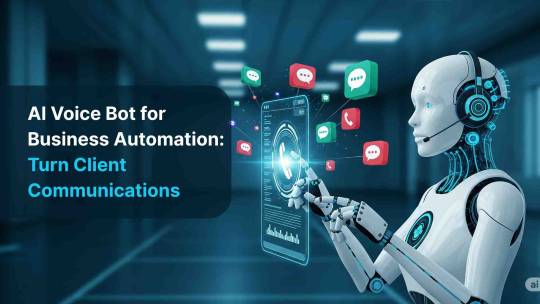
AI voice bot for business automation change how companies communicate with customers today. Businesses need faster response times and better customer service. Traditional phone systems cannot handle the growing demand efficiently. PreCallAI offers a revolutionary solution that transforms phone conversations completely.
Our advanced voice bot technology automates customer interactions naturally. Businesses save time while improving customer satisfaction rates significantly. Manual phone handling creates bottlenecks and missed opportunities daily. PreCallAI eliminates these problems through intelligent conversation automation.
Companies across industries struggle with limited phone capacity. Staff availability restricts business hours and response capabilities. Customer expectations continue rising for instant service delivery. PreCallAI bridges this gap with 24/7 automated phone conversations.
What Makes PreCallAI Different
PreCallAI creates game-changing voice bot solutions for modern businesses. Our technology understands natural language and responds appropriately. Advanced AI algorithms learn from every customer interaction continuously. Speech recognition accuracy exceeds industry standards consistently.
Real-time conversation management handles complex customer requests effectively. Integration capabilities connect with existing business systems seamlessly. Customizable voice personalities match your brand identity perfectly. Multi-language support expands your customer reach globally.
Appointment scheduling happens automatically without human intervention. Lead qualification processes identify high-value prospects efficiently. Customer support automation resolves issues instantly. Sales conversations nurture prospects through personalized interactions.
Advanced Features That Drive Results
PreCallAI voice bots handle multiple conversations simultaneously. Call routing directs customers to the appropriate departments automatically. Sentiment analysis detects customer emotions during conversations. Escalation protocols transfer complex issues to human agents.https://precallai.com/
CRM integration synchronizes customer data across platforms. Analytics dashboards provide detailed conversation insights. Performance metrics track success rates and improvement areas. API access enables custom integrations with specialized software.
Voice recognition works with various accents and speaking styles. Background noise filtering ensures clear communication always. Call recording provides quality assurance and training materials. Backup systems prevent service interruptions during peak times.https://precallai.com/
How AI Voice Bot for Business Automation Transforms Operations
Implementing an AI voice bot for business automation delivers immediate operational improvements. Response times decrease from minutes to seconds consistently. Customer satisfaction scores increase through faster service delivery. Operating costs reduce while service quality improves dramatically.
Staff productivity increases as employees focus on complex tasks. Missed calls become extinct with 24/7 availability. Consistent messaging ensures brand uniformity across interactions. Scalability allows growth without proportional staffing increases.
Revenue generation improves through automated upselling capabilities. Data collection provides valuable customer insights automatically. Lead conversion rates increase with instant follow-up processes. Appointment booking rates improve through immediate scheduling.
Business owners gain complete control over customer communications. Real-time monitoring ensures quality standards are maintained. Customization options adapt to specific industry requirements. Training time is reduced significantly compared to human staff.
Industry-Specific Applications
Healthcare practices benefit from automated appointment scheduling systems. Patient reminders reduce no-show rates significantly. Medical offices handle prescription refill requests efficiently. Dental clinics manage follow-up calls automatically.
Real estate agencies automate lead qualification processes effectively. Property inquiries receive instant responses and information. Showing appointment schedule automatically based on availability. Follow-up calls nurture prospects through sales funnels.
Professional services streamline client intake procedures completely. Legal practices handle initial consultations efficiently. Accounting firms manage client communications during busy seasons. Consulting businesses qualify prospects before human interaction.
E-commerce companies improve customer support capabilities dramatically. Order status inquiries receive instant, accurate responses. Product questions get answered immediately without delays. Return processes initiate automatically through voice commands.
Implementation Process Made Simple
PreCallAI simplifies voice bot implementation for any business size. Initial consultation identifies optimal use cases and strategies. Custom script development reflects unique business requirements perfectly. Integration planning connects systems without disrupting operations.
Testing phases ensure optimal performance before full deployment. Staff training covers system management and monitoring procedures. Quality assurance protocols maintain service standards consistently. Performance optimization continues throughout the implementation process.
Business goals align with technology capabilities through strategic planning. Customer needs receive priority consideration during development. Workflow integration maintains existing processes while adding automation. Change management supports smooth transitions for all stakeholders.
Measuring Success and ROI
Key performance indicators track system effectiveness accurately. Call volume metrics demonstrate capacity improvements clearly. Response time measurements show service delivery enhancements. Conversion rates indicate lead generation success.
Cost savings calculations compare traditional staffing with automation expenses. Customer satisfaction surveys reveal service quality improvements. Revenue attribution demonstrates direct business impact. Productivity metrics quantify staff efficiency gains.
Monthly reports provide comprehensive performance analysis. Trend identification reveals optimization opportunities. Comparative data validates technology investment decisions. Strategic insights guide future expansion planning.
Real Business Benefits
PreCallAI customers experience dramatic operational improvements immediately. Phone capacity increases without additional staff hiring. Customer complaints decrease through faster response times. Sales opportunities multiply through automated follow-up processes.
Administrative tasks are reduced significantly through voice automation. Data entry happens automatically during conversations. Scheduling conflicts resolve through intelligent calendar management. Customer information updates occur in real-time.
Competitive advantages emerge through superior customer service delivery. Market expansion becomes possible with multilingual capabilities. Operating hours extend to 24/7 without staffing complications. Service consistency improves across all customer touchpoints.
Brand reputation is enhanced through reliable customer communications. Customer retention rates increase with improved service quality. Referral generation improves through positive customer experiences. Market differentiation occurs through advanced technology adoption.
Getting Started Today
PreCallAI makes voice bot implementation straightforward and efficient. Free consultations identify specific business needs and opportunities. Custom demonstrations show exact benefits for your operations. Flexible contracts accommodate varying business requirements.
Technical setup happens quickly with minimal business disruption. Training resources help teams maximize system capabilities. Ongoing support addresses questions and optimization needs. Scalability options allow growth without system limitations.
Transform your customer communications with PreCallAI voice bot technology. Experience automated conversations that build relationships and drive results. Contact our team to discover how an AI voice bot for business automation revolutionizes your operations. Schedule your consultation today and start improving customer communications immediately.
Conclusion:-
AI voice bot for business automation revolutionizes customer communications with 24/7 availability, instant responses, and seamless integration. PreCallAI transforms operations by reducing costs, increasing productivity, and improving customer satisfaction. Experience automated conversations that drive results and business growth today.
#AI voice bot for business automation#Customer communications automation#Automated phone conversations#Voice bot technology#Business process automation#Customer service automation#Appointment scheduling automation#Lead qualification automation#24/7 customer support#Natural language processing#Speech recognition technology#CRM integration#Call routing automation#Customer satisfaction improvement#Automated customer interactions#Voice recognition system#Business communication solutions#Automated sales conversations#Customer support chatbot#Real-time conversation management
0 notes
Text
Maximize Customer Interaction Efficiency with Our IVRS System's Top Features
Dear Subscribers, We are excited to introduce the top features of our Interactive Voice Response System (IVRS), designed to revolutionize your customer interactions and business efficiency. Our IVRS system offers. Best regards, Zentrans tech Team
“Unlock the powerful features of our IVRS system!” Top Features of Our IVRS System Our Interactive Voice Response System (IVRS) is designed to streamline customer interactions and enhance the efficiency of your business communications. Below are the top features that make our IVRS system stand out: 1. Multi-level IVR Menus Our IVRS system supports multi-level menus, allowing customers to…

View On WordPress
#24/7 Availability#Business Automation#Business Efficiency#Business Growth#Call Analytics#Call Routing#CRM Integration#Customer Experience#Customer Satisfaction#Customizable Prompts#Data Security#Interactive Voice Response#IVRS#Multi-Language Support#Scalable Solutions#Self-Service#Tech Innovation#Voice Recognition#Voice Technology
0 notes
Text
What Makes Real-Time Voice Bot Solutions a Must-Have for Omnichannel Customer Engagement
The era of omnichannel customer engagement is no longer a futuristic concept—it's today’s business reality. Customers expect seamless, consistent experiences across all touchpoints: web, mobile apps, messaging platforms, and voice channels. As enterprises invest in integrated engagement strategies, real-time voice bot solutions have emerged as a powerful enabler of true omnichannel communication.
Unlike traditional IVR systems or asynchronous chatbots, real-time voice bots offer fast, intelligent, and human-like conversations that can be initiated and continued across channels without friction. These AI-powered systems are redefining how brands interact with customers, making them a must-have for any enterprise looking to succeed in an omnichannel landscape.
This blog explores in-depth how real-time voice bots support omnichannel customer engagement, their key benefits, and why they’ve become an essential tool in 2025 and beyond.

1. The Shift from Multi-Channel to Omnichannel
Before diving into the role of real-time voice bots, it’s important to distinguish between multi-channel and omnichannel engagement:
Multi-channel means a company is available across different platforms (e.g., website, social media, call center), but these channels often operate in silos.
Omnichannel takes it further by ensuring all customer interactions are integrated, consistent, and continuous across platforms.
Customers don’t see channels—they see one brand. And they want their conversations to flow naturally from one platform to another. This is where real-time voice bot solutions shine, acting as intelligent touchpoints that bridge these channels with context and continuity.
2. What Are Real-Time Voice Bot Solutions?
Real-time voice bots are AI-powered voice assistants that engage in natural, spoken conversations with users. Leveraging cutting-edge technologies like:
Automatic Speech Recognition (ASR)
Natural Language Understanding (NLU)
Text-to-Speech (TTS)
Contextual AI
These bots interpret customer intent and respond instantly with appropriate and contextual replies. Unlike static menus or chatbots limited to text, voice bots offer real-time, bidirectional audio conversations—delivering a more intuitive and human-centric interaction.
3. Role of Voice Bots in Omnichannel Strategy
a. Seamless Channel Transitions
Customers often start an interaction on one platform and switch to another. For example, a customer might initiate a product inquiry via a mobile app chatbot and later call support to finalize the purchase.
Real-time voice bots ensure context is carried over between these touchpoints. When integrated with CRMs and engagement platforms, voice bots can retrieve customer history and continue the conversation without asking the user to repeat themselves.
b. Unified Customer Profiles
Every interaction with a voice bot—be it order status, feedback, or a complaint—is automatically logged and synced across systems. This builds a 360-degree customer profile that empowers human agents and other bots to deliver hyper-personalized experiences on any channel.
c. Always-On, Real-Time Availability
Voice bots operate 24/7, offering instant responses across all time zones and regions. This is crucial in an omnichannel world where customers expect help at any moment, regardless of channel or geography.
4. Why Real-Time Voice Bots Are a Must-Have in 2025
1. Changing Customer Expectations
Modern customers expect:
Instant gratification
Personalized experiences
Seamless transitions across platforms
Real-time voice bots meet these expectations by providing speed, context, and empathy. With natural speech capabilities and AI-powered intent recognition, they ensure every interaction feels relevant and valuable.
2. Rise of Voice-First Interfaces
Smartphones, smart speakers, and virtual assistants like Alexa and Google Assistant have made voice the preferred interface for many users. As a result, integrating real-time voice bots into omnichannel strategies enables brands to meet customers where they already are—through voice.
3. Scalability Without Sacrificing Quality
Unlike human agents, voice bots can handle thousands of conversations simultaneously without delays or fatigue. This scalability ensures consistent service quality even during seasonal spikes, promotional campaigns, or crises—making them indispensable for large enterprises.
4. Cost Efficiency and Operational Excellence
Deploying voice bots in customer service, support, and sales dramatically reduces call volumes, wait times, and agent workload. While bots handle repetitive or basic queries, human agents can focus on complex, emotionally charged issues—driving both productivity and customer loyalty.
5. Key Features That Enhance Omnichannel Engagement
a. Real-Time CRM Integration
Voice bots fetch and update customer data in real-time, allowing them to personalize interactions and enable seamless follow-ups across channels.
b. Sentiment and Emotion Detection
Advanced voice bots can detect emotional tone, urgency, and intent, allowing them to respond with appropriate empathy—or escalate to human agents when needed.
c. Multilingual and Regional Support
Global enterprises benefit from voice bots that speak and understand multiple languages, providing localized experiences across diverse customer bases.
d. Smart Escalation Paths
Voice bots recognize when an issue needs a human touch and hand off seamlessly to a live agent, transferring all contextual data to avoid repetition and enhance efficiency.
6. Real-Time Voice Bot Use Cases Across Channels
Contact Center Integration
Voice bots handle first-level inquiries and reduce inbound call volume in customer care. They’re perfect for password resets, delivery status checks, or subscription changes.
Website and App Integration
Real-time voice capabilities embedded into websites or apps allow users to speak directly to a bot instead of typing—delivering accessibility and convenience.
Messaging Channels
Voice-enabled bots on platforms like WhatsApp, Facebook Messenger, or Telegram let users send and receive voice messages, increasing engagement and ease of use.
Smart Devices
Voice bots integrated with IoT and smart speakers provide hands-free, voice-driven services for industries like healthcare, finance, and e-commerce.
7. Real Business Impact: Results That Matter
Increased Customer Satisfaction
Faster, more personalized interactions across channels lead to higher CSAT and NPS scores.
Lower Operational Costs
Voice bots reduce dependency on large support teams while ensuring service coverage 24/7.
Boosted Revenue
With intelligent upselling and lead nurturing, real-time voice bots support sales conversion and customer retention across touchpoints.
Enhanced Brand Loyalty
Consistent and memorable interactions across channels foster trust, reliability, and long-term customer loyalty.
8. How to Implement Voice Bots in Your Omnichannel Strategy
Step 1: Define Use Cases and Goals
Identify where real-time voice bots will add the most value—customer service, lead generation, feedback collection, etc.
Step 2: Choose the Right Platform
Opt for a scalable, AI-driven voice bot platform that supports multi-language, multi-channel, and real-time analytics.
Step 3: Integrate with Existing Systems
Ensure deep integration with CRM, contact center software, and communication platforms to unify customer data.
Step 4: Design Conversational Flows
Create natural, intuitive conversation scripts that mirror how customers speak. Incorporate fallback logic and escalation paths.
Step 5: Continuously Optimize
Leverage analytics, feedback, and conversation insights to fine-tune bot performance and enhance user satisfaction.
Conclusion: The Future Is Voice-Led, Omnichannel, and AI-Driven
In a hyperconnected digital economy, customer experience is a competitive differentiator. Businesses that embrace real-time voice bot solutions are future-proofing their customer engagement strategies—delivering personalized, consistent, and instant interactions across every touchpoint.
By bridging the gap between channels and blending AI with human empathy, voice bots are not just enhancing omnichannel strategies—they’re redefining them. In 2025 and beyond, companies that prioritize real-time, voice-enabled omnichannel engagement will lead the pack in customer satisfaction, loyalty, and growth.
0 notes
Text
IVR Software in Dubai
In today’s fast-paced digital world, businesses in Dubai are increasingly turning to smart automation solutions to enhance their customer service operations. One such transformative solution is IVR Software in Dubai—a powerful tool that streamlines communication, reduces operational costs, and improves customer satisfaction.
Interactive Voice Response (IVR) software is not just a basic telephony feature anymore. It has evolved into a comprehensive communication interface that plays a pivotal role in managing high call volumes, routing queries to the right departments, and enabling 24/7 support. Whether you are a large-scale enterprise or a growing startup, deploying IVR Software in Dubai can give your business the competitive edge it needs.
What is IVR Software and Why Does It Matter?
IVR software is an automated telephony system that interacts with callers, gathers information, and routes calls to the appropriate recipient. It allows customers to use voice commands or keypad inputs to navigate a menu system, without the need to speak to a live agent.
In Dubai, where businesses thrive in a highly competitive and technologically advanced market, the demand for efficient communication tools has never been higher. That’s where IVR Software in Dubai comes into play. It acts as the frontline of customer interaction—handling inquiries, complaints, order tracking, and appointment bookings with unmatched precision.
Key Features of Aria Telecom’s IVR Software
Aria Telecom, a leading telecom solutions provider, offers robust and customizable IVR software solutions tailored to meet diverse business needs in Dubai. Here are some of the standout features:
Multi-level IVR Menus: Create complex, yet user-friendly menu structures to handle various customer needs.
Call Routing and Forwarding: Direct calls to specific departments or agents based on caller inputs or business logic.
Text-to-Speech & Speech Recognition: Enable natural conversations with human-like interaction using advanced speech technologies.
CRM Integration: Seamless integration with existing Customer Relationship Management systems for personalized service.
Call Recording and Analytics: Monitor, evaluate, and optimize customer interactions for improved service quality.
Benefits of Using IVR Software in Dubai
Implementing IVR software delivers a range of benefits to businesses in Dubai, including:
Enhanced Customer Experience: Customers can quickly access the information they need without waiting on hold or repeating themselves.
24/7 Availability: IVR systems can handle queries outside of regular business hours, ensuring your business is always reachable.
Operational Efficiency: Automating repetitive tasks like FAQs and payment processing frees up human agents for more complex issues.
Scalability: Whether handling hundreds or thousands of calls, IVR software can scale with your business needs.
Cost Savings: Reducing the need for a large customer support team translates into significant cost savings.
Use Cases of IVR Software in Dubai Businesses
From healthcare providers scheduling appointments to banks handling account queries, IVR systems are widely used across industries in Dubai. Here are some examples:
Retail: Automate order status checks, returns, and product information queries.
Healthcare: Schedule, reschedule, or cancel appointments through an automated voice system.
Finance: Provide account balance information, recent transaction history, and card service options.
Education: Share course updates, exam schedules, and attendance records with parents and students.
Why Choose Aria Telecom?
Aria Telecom has a proven track record of delivering cutting-edge telecom solutions across the UAE. Their IVR software stands out for its high reliability, customizable features, and ease of integration with existing systems. Backed by exceptional customer support and technical expertise, Aria Telecom ensures that your communication systems are always optimized for performance.
If you're ready to enhance customer interaction, improve service delivery, and future-proof your communication system, then it's time to adopt IVR Software in Dubai from Aria Telecom.
#IVRSoftwareDubai#AriaTelecomSolutions#CustomerServiceAutomation#TelecomInnovationUAE#DubaiBusinessTech
0 notes
Text
Beyond Sales: The Heartbeat of CRM Lies in Customer Retention

Let’s be honest — getting a new customer is exciting. The chase, the pitch, the first conversion — it all feels like a victory. But you know what’s even more powerful (and often ignored)? Keeping that customer.
In the world of CRM (Customer Relationship Management), there’s a silent hero that often gets overshadowed by flashy lead-gen tactics and aggressive sales strategies. It’s called customer retention — and believe me, this is where your real revenue lives.
What Exactly Is Customer Retention in CRM?
Customer retention, in simple terms, is your brand’s ability to keep your existing customers engaged, satisfied, and loyal over time.
When used right, your CRM becomes more than a database — it becomes the emotional memory of your business. Every touchpoint, every follow-up, every email — it tells your customer: “We remember you. We value you. We want you to stay.”
CRM helps you build emotional equity, not just transactional relationships.
Why Customer Retention Matters More Than Ever
Let’s break some harsh truths, shall we?
Acquiring a new customer can cost 5 to 7 times more than retaining an existing one.
A mere 5% increase in customer retention in crm can boost profits by 25% to 95%.
Loyal customers don’t just buy more — they trust more. They refer more. They become your brand's voice.
So, if your CRM is only chasing new leads without nurturing old ones, you’re building a leaking bucket. What’s the point of pouring water (new customers) if it keeps dripping out?
The Emotional Science Behind Retention
Think about this:
You walk into your favorite coffee shop, and the barista smiles and says, “Your usual, Neeraj?” Feels good, right?
That’s not just service — that’s emotional memory. And that’s exactly what great CRMs are built for.
A powerful CRM doesn’t just track names and numbers. It remembers birthdays, preferences, purchase patterns, complaints, compliments — all those little things that say “We know you.”
And in today’s distracted world, being remembered is the most underrated marketing advantage.
How CRM Actually Boosts Customer Retention (Without Feeling Pushy)
Here’s how an emotionally intelligent CRM system works silently to improve retention:
1. Personalized Communication
Whether it's a birthday email or a product recommendation based on past behavior — personalization reminds the customer that you’re watching them in a good way. It makes them feel seen, not sold to.
2. Follow-Ups That Don’t Feel Robotic
A good CRM automates follow-ups — yes — but if done right, they feel like they’re written by a real human. “Hey, just checking in. How did that product work out for you?” — this simple line can build a bridge.
3. Handling Complaints Like Conversations
CRM logs every issue raised, and more importantly, how it was resolved. When you follow up with, “We’re glad we could fix it last time. Just checking if things are better now,” — you win trust. Every single time.
4. Loyalty Programs That Actually Reward Loyalty
Through CRM analytics, you can segment your top customers and offer them something they’ll remember — not discounts, but recognition. A thank-you note. Early access. Real human value.
5. Customer Journey Mapping
CRM lets you see where the customer is in their journey — new, mid, loyal, or slipping away. This helps you intervene emotionally, not just strategically. A re-engagement message at the right time can save a goodbye.
Real Talk: Retention Is Not a Feature — It’s a Culture
Most brands treat customer retention as an “add-on.” Like something that happens after the sale. But the truth is — retention starts at first contact.
When your CRM is wired to listen, understand, and remember — you’re not just retaining customers, you’re building relationships. And relationships are what brands are made of.
The companies that win in 2025 and beyond won’t be the ones with the most leads — they’ll be the ones with the most loved customers.
Common Mistakes Brands Make (And How CRM Fixes Them)
Let’s call them out:
Over-automating: If your CRM sounds like a robot, your customer will treat you like one.
One-size-fits-all messaging: Not every customer wants the same thing. CRM helps you segment and speak their language.
No feedback loop: Customers who give feedback are a gift. CRM allows you to capture, respond, and act on that gold.
No emotional checkpoints: Sometimes a customer doesn’t churn because of price — they churn because they don’t feel valued. CRM keeps that emotional pulse alive.
Final Thought: Retention Is the Real ROI
You don’t need more leads. You need more love. And love isn’t found in numbers — it’s found in memories, meaning, and moments. That’s what a great CRM does. It creates those moments.
When done right, customer retention in CRM is not a technical process — it’s an emotional commitment. One that says: “You’re not just a transaction. You’re our story
0 notes
Text
AI Tools in Marathi for Rural Development
The rise of AI Tools in Marathi is transforming how people in Maharashtra interact with smart technology. By localizing AI platforms, developers are empowering native speakers to benefit from the digital revolution without the barrier of language.
Traditionally, most AI tools have been available in English. However, this has limited access for a vast portion of the Marathi-speaking population. With advancements in Natural Language Processing (NLP) and voice recognition, tools are now built to understand and respond in Marathi – offering a more inclusive tech experience.
For instance, voice assistants like Google Assistant and Alexa now understand basic Marathi commands. Chatbots and customer service bots for local banks and e-commerce platforms are increasingly using Marathi to improve user experience. These AI tools are enhancing communication, automating tasks, and helping businesses serve regional clients more efficiently.
In the education sector, AI-powered learning apps now support Marathi translations, helping students from rural areas grasp lessons better. Teachers can use Marathi AI transcription tools to create notes, quizzes, and study material with ease.
Startups and entrepreneurs are also benefiting from these AI tools. They now use Marathi-enabled CRMs, marketing automation tools, and AI-generated content systems to reach local audiences.
Overall, AI Tools in Marathi are helping bridge the digital divide, especially for non-English speakers. They bring the power of AI into the hands of millions who prefer interacting in their mother tongue.
By embracing this shift, Maharashtra is not just keeping up with global AI trends—it’s setting an example for regional language empowerment through artificial intelligence.
0 notes
Text
Cloud Telephony in India: Top Trends and Future Scope

Introduction: The Communication Shift in Modern India
Over the past decade, the way businesses communicate has drastically evolved. With the rise of digital infrastructure and affordable cloud-based solutions, companies are moving away from traditional phone systems. Cloud telephony in India has emerged as a game-changer, empowering businesses with flexible, scalable, and cost-effective communication tools.
Key Drivers Behind the Growth of Cloud Telephony
Several factors have contributed to the rise of cloud-based communication across the country:
Remote & Hybrid Work Models: Businesses now require tools that support remote teams and ensure seamless connectivity.
Digital Transformation: Enterprises are increasingly adopting cloud platforms to modernize operations.
Customer-Centric Communication: Instant, multi-channel customer interactions are crucial, and cloud telephony supports these demands efficiently.
Emerging Trends in Cloud Telephony
Here are the top trends shaping the future of business communication:
AI-Powered IVRs: Voice recognition and intelligent routing are enhancing the customer experience.
Omnichannel Integration: Cloud telephony is merging with platforms like WhatsApp, email, and SMS to offer unified communication.
Data-Driven Analytics: Companies are leveraging call analytics to improve service quality and decision-making.
Self-Service Portals: Businesses can now customize call flows and manage services without external help.
Choosing the Right Solution: Best Cloud Telephony Providers in India
With so many options available, businesses must carefully evaluate the Best Cloud Telephony Providers in India before making a decision. Consider factors such as:
Uptime & Reliability
Ease of Integration with CRMs
Customization & Scalability
Data Security & Compliance
Some providers offer niche features like real-time analytics, advanced call routing, and global number provisioning. It’s essential to compare offerings to find the right fit for your organization.
Why Kommuno Stands Out in a Competitive Market
Kommuno has carved a unique space by focusing on simplicity, performance, and tailored service. Whether you're a startup, SME, or enterprise, Kommuno offers robust features like:
Click-to-call from CRM
Virtual numbers with smart routing
Real-time dashboards for performance tracking
24/7 support and onboarding assistance
The platform is designed to help businesses improve customer interactions while reducing operational complexity.
The Future Scope of Cloud Telephony in India
The future looks promising. With 5G rollout, increased internet penetration, and rapid tech adoption across sectors, cloud telephony in India is set to expand even further. Industries such as healthcare, BFSI, retail, and edtech are integrating these solutions to stay ahead of customer expectations. Over the next few years, expect tighter integrations with AI, voice bots, and predictive analytics.
Final Thoughts: Embrace the Change
Modern communication is no longer just about making calls. It's about creating seamless, smart, and measurable experiences. Businesses that adapt to cloud-based systems today will have a distinct advantage tomorrow. By aligning with the Best Cloud Telephony Providers in India and trusted platforms like Kommuno, you're not just investing in technology — you're investing in future-ready growth.
#cloud telephony providers#cloud telephony services#cloud telephony solutions#best cloud telephony providers in india#cloud telephony
0 notes